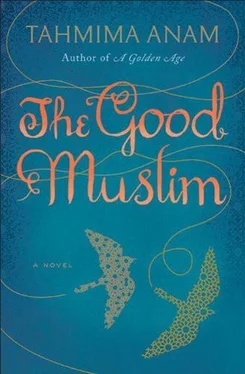Blood flowed from the man’s neck. Sohail picked up his scarf and unwrapped the man’s face, and as he looked down the realisation crashed into him with the force of a bullet. Beta . This man was not a soldier. He was not a soldier or a Bihari or any kind of enemy. He was just a very old man, salt-and-pepper hairs on his stubbly chin. And he had the face of a father, a kind, unremarkable, worried face. A nothing man. A man who had done nothing. Walking home from the war like everyone else.
Sohail’s life, in exchange for that death. Paying for it in flesh and blood. It must be there, ticking within him. It was why he had shunned Ammoo, because she had not taught him well enough. If she had given him the Book sooner, he might have known better. He might not have done it.
The next day Maya is visited by a stocky man in a tight-fitting suit. He introduces himself as her lawyer. ‘Now,’ he begins, ‘I’m afraid the situation is a little more complicated than we thought. The mullahs have ganged up against you.’
She was right. It was that Huzoor, acting meek and plunging the knife into her back.
‘Problem is, the Dictator has been trying to cosy up to them, so he’s taken against you. And you didn’t help your case, by making him look like a fool.’
The Dictator? She is confused. ‘I thought I was in jail for kidnapping my nephew, Zaid.’
‘I heard about that, madam, and I’m very sorry. But this is far more serious.’
What could be more serious?
‘They are trying to decide whether to bring a charge of slander or a charge of treason against you. As you can imagine, treason would be far worse. Luckily, the public is on your side — there is a protest march at Shaheed Minar tomorrow. For you and Shafaat.’
Shafaat? It comes to her now. She is in jail because she wrote that article, because she called the Dictator a war criminal. The lawyer tells her the whole story. Shafaat and Aditi have been arrested too. Were they angry, she wants to know. He laughs openly, because being arrested is exactly what Shafaat has always wanted. He’s a hero, she’s done him a favour.
She buries her face in her hands. They had not come for her because of Zaid. No one had cared about that little boy. She tastes it again, the dark purple water.
*
In the courthouse her hands were untied and she was instructed to take her place beside the lawyer. Joy was sitting in the front row in a crumpled kurta. For the last few weeks Maya had felt herself turning into a thing of little substance, her wrists becoming brittle, her cheeks hollow and grey. How ugly she must look. She caught his eye as he stared at her, unblinking.
The lawyer placed a helmet of curls on his head. The judge entered and they all stood up.
‘Your honour,’ the lawyer said in perfect, foreign-learned English, ‘I have come to plead for bail for Miss Sheherezade Haque.’
‘The charge is not bailable,’ the judge said, clearing his throat and making as if he were about to spit. Of course the charge was not bailable. It should not be.
‘Your honour, we dispute the charge of treason. Miss Haque — if it was, indeed, Miss Haque — was merely exercising the freedom granted to her by the constitution of Bangladesh.’
‘We are under martial law, sir, may I remind you?’
‘Yes, your honour, but I have taken the liberty of presuming you answer to a higher authority, sir. To our democratic constitution.’
The judge paused, turned to her. ‘And how would you plead, Miss Haque, if it were up to you? Treason, as you know, is a very serious charge.’
Maya found her voice. ‘I have committed no treason, your honour,’ she said. ‘I am guilty only of telling the truth.’
‘Taking away a citizen’s right to protest is a serious offence, your honour. The article, as you know, was written primarily as a plea to try the war criminals, not as a slight against the Dictator.’
The judge’s face narrowed. ‘What exactly are you asking of this court?’
The lawyer raised his arms. ‘Miss Haque’s brother was a freedom fighter. Her mother was a quiet, unsung hero of the revolution. She is following in her family’s footsteps. And I am merely trying to appeal to the ideal of justice to which your court is bound.’
The judge appeared to consider this. ‘You were a freedom fighter, Miss Haque?’
‘I was and I am, your honour.’
He peered down at her, as if to check the veracity of the statement. ‘Then we will let the court decide your fate. Bail is granted,’ he said gruffly. ‘Miss Haque, you are free to go.’
After the judge’s decision was announced, Maya glanced behind her, searching for Joy. At the back, she had to look twice, three times. There was Sohail, his eyes cast downward, so that she could see the top of his head, the thick turban that had replaced his prayer cap. He mouthed something to himself, then looked up, meeting her eye. She felt her legs buckling under her, the terrible weight of herself. ‘I have to go,’ she said to the lawyer, ‘please, hurry.’ And she made her way to Sohail, grabbing his hand and saying, ‘Zaid, did they find him?’
‘In the water, last Saturday.’ His eyes were dark and hooded. They had hidden it from her. They had buried him, whispered their prayers.
So this was what her life amounted to. A boy’s body washed up on the shores of the Jamuna. She wanted to throw herself at Sohail’s feet and beg for his mercy, but she didn’t deserve it. She waited for him to hit her. To open that lip again. Without meaning to, she spoke aloud. ‘I was trying to save him.’
‘He was not yours to save,’ he said simply.
He wasn’t hers. He had never been hers. To whom had he belonged, then? This robed father who lived behind a high wall, behind a string of verses? She felt the bitterness rising in her throat. ‘You put him in danger, Sohail — I tried to tell you.’
‘What did you think, Maya — that I wasn’t going to get him out of there?’
She faltered. ‘But I thought. I thought you said—’
‘I said I would ensure his safety.’
He would have gone himself. He would have gone, he would have saved his own son, he would have brought him back. Right now they would have been in the garden, sucking flowers from the ixora bush. ‘Then it was me — I’m responsible for his death.’
‘Only God can choose the hour of a man’s death,’ he said.
She didn’t believe him. She wasn’t willing to shed her responsibility, and she was about to tell him so, that he needed to account for it — they both did — but something moved in her, something told her to accept what he was offering, a way to make sense of it, a way to forgive her. And even though she didn’t want forgiveness — no, she did not want to be forgiven — she was relieved by its having been offered, by the germ of possibility that there was something beyond the two of them, beyond his heart and hers. God offers forgiveness , she remembered from the Book, for men who surrender to him, and women who surrender to him. For men who believe, and women who believe .
She dared to meet his eye. She wanted to ask if he could love her again, but she did not. Instead she said, ‘I believe you.’
He nodded. She wondered why he had come. To see her imprisioned, probably. To add his charge to the others. I hereby charge my sister, Maya, with the following crimes: not believing me when I turned to the Book, for mocking my allegiance to my faith, for attempting to lure me back to an old life, for abandoning me to whatever demons came to haunt me after our war, after we took our fingers out of the sky. For not loving me. For loving my son. For killing him.
After a long time, he said, ‘I’m leaving. After the forty days, I’m going to Saudia.’
Читать дальше












